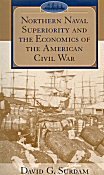
SURDAM : Northern naval superiority and the economics of the American Civil War (fülszöveg)
Addressing an aspect of the Civil War that has long been a source of controversy among historians, David G. Surdam offers an unconventional analysis in this study of the Union's naval blockade. He questions common methods of evaluating the strength of the 3,500-mile siege line, disputes widely held interpretations of its impact, and explores previously unexamined aspects of the blockade as he presents a case for the effectiveness of the Union naval effort.
Surdam seeks to explain the failure of the Confederacy to wage war and sustain independence despite an apparently sufficient supply of raw cotton to trade with Europe and Canada for war matériel and enough beef and corn to feed its troops. To do so he expands the traditional approach to the blockade, finding that a focus on the number of goods that slipped past Union ships overlooks two of the blockade's most important achievements: disrupting intraregional trade and denying the Confederacy badly needed revenue from the export of raw cotton and other staple products.
Explicating the blockade's indirect yet devastating results, Surdam examines the degradation of railroad lines, collapse of specific internal markets, and effect on the exportation of cotton. He shows that the blockade forced more traffic to the railroads, and as railroads and locomotives broke down or were devastated by war, the blockade hampered the importation of rail iron, locomotives and cars, and other parts and machinery. He also explores how the blockade affected the cross-country movement of crops to hungry soldiers and civilians and how costs associated with blockade consumed most of the higher prices that Europeans paid for southern cotton.